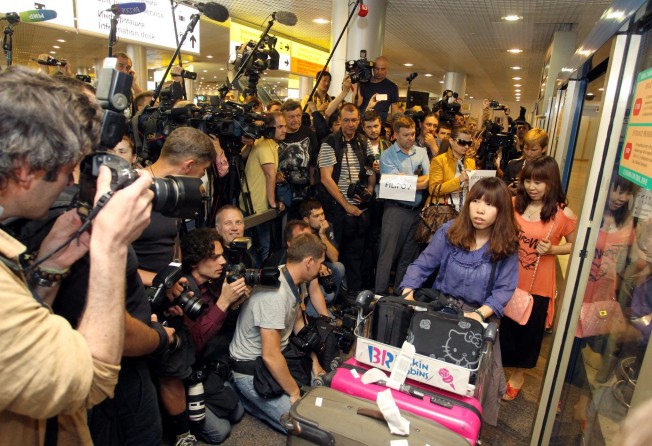Hundreds of media scour Moscow unsuccessfully for Edward Snowden
But none of the hordes of journalists across Moscow manage to glimpse man of the moment

Edward Snowden's arrival in Moscow set hordes of journalists fanning out across the city in hopes of spotting the whistle-blower and unleashed a torrent of rumours worthy of the darkest days of the cold war.
Scores of reporters and camera crew members crowded around Terminal F at Sheremetyevo International Airport, which no doubt was state of the art when it was built - for the 1980 Olympics. Its ceiling lights resemble coffee cans, or perhaps giant listening devices. The dim lighting casts an air of foreboding over a Moscow arrival. There was no Snowden sighting.
The passengers who trooped through the arrival area were besieged by reporters seeking information about Snowden, who has been charged with espionage in the United States for revealing the country's secret surveillance programmes. But the arriving passengers had little intelligence to offer, saying that they did not know whether or not Snowden was on the flight or that maybe he was but they had not been looking for him so would not have recognised him.
Russian security vehicles surrounded the plane when it landed, while plain-clothes Russian agents trawled the terminal, deflecting questions about which state agency they represented by pretending to be businessmen from Munich and journalists from state-run NTV.
Then a Venezuelan contingent was said to be there, fuelling speculation that Snowden was being whisked away to the country's embassy in Moscow, and his final destination was Caracas.
The Venezuelan embassy is conveniently located just up the street from a nest of journalists, the building on Sadovaya-Samotechnaya Street where many journalists were forced to live during the Soviet era, guarded by KGB officers who kept most Russians out. But two hours after the flight from Hong Kong had landed, nothing seemed to be happening at the embassy.
The Ecuadoran embassy also offered little pay-off for a stake-out. An Ecuadoran diplomat's car was observed parked at the airport - identified by the Soviet system of assigning certain numbers to certain countries. RT, the television broadcaster financed by the Russian government, reported that a doctor from the embassy was examining Snowden at the airport. Russian officials said next to nothing, observing only that they had heard the reports.
The heart of the intrigue beat at the airport: if Snowden remained within the transit zone, he did not need a visa and could stay there until catching an onward flight, undetected by the television cameras waiting on Russian soil.
According to the website of the Russian embassy in Washington, a transit visa is required only if a passenger stays longer than 24 hours or if a change of airport is required.
The Interfax news agency said that if diplomats with official number plates met Snowden at the steps to the plane, they could bundle him into the car and take him away without ever stepping on official Russian soil, meaning he could spend the night in diplomatic comfort.
"After getting into the car right from the gangway," Interfax quoted one person as saying, "Snowden formally will not be in Russia. In accordance with the extraterritoriality principle, diplomatic cars are part of the country represented by the embassy."
That was a scenario straight out of a spy movie, and Interfax later reported that Snowden in fact would need a visa even to get into a diplomatic car.
Meanwhile, Sergei Bout, whose brother Viktor was convicted in New York of arms smuggling and sentenced to 25 years in jail, suggested that Russia seize Snowden and trade him for Bout. The Bout case infuriated Russian officials, who were angry that the United States was able to extradite the Russian citizen from Thailand, and they have been demanding his return home.
Then there is the question of asylum. When reporters asked Dmitry Peskov, spokesman for President Vladimir Putin, whether Russia would consider giving Snowden sanctuary, he replied that all applications were considered. Not exactly a robust invitation, but a comment that was enough to set off plenty of speculation.
A late rumour: Interfax reported that Snowden was in Terminal E at the airport, where he had a room in a hotel within the transit zone. Reporters said they had heard talk of paperwork problems, so he would no doubt be subjected to many questions. And so the last question: Who would be asking?
The Washington Post, The Guardian